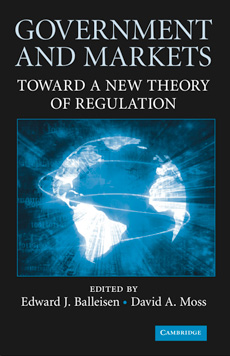
PURCHASE
Edited by Edward Balleisen (Duke University) and David Moss (Harvard Business School)
ISBN-13: 9780521118484; 560 pages. Hardback available for purchase November 2009.
Praise for Government and Markets
“The heritage of James Tobin is well represented by this outstanding volume. The authors analyze the relations of government and the market from many different angles, showing the fallacies of simple critiques on the basis of deep scholarship.”
— Kenneth J. Arrow, 1972 Nobel Laureate in Economics
“A deeply distinguished multidisciplinary gathering lays out new directions and bold challenges for regulatory theory and practice. The hope and promise of this work is for a more civilized and creative capitalism.”
— John Braithwaite, Australian National University
|
Summary
As the financial crisis has shown, neither traditional market failure models nor public choice theory, by themselves, sufficiently inform or explain our current regulatory challenges, nor point us toward the best solutions. Regulatory studies, long neglected in an atmosphere focused on deregulatory work, are in critical need of new models and theories that can guide effective policymaking. This interdisciplinary volume points the way toward the modernization of regulatory theory: its essays, by leading scholars in a number of fields, move past predominant approaches to integrate the latest research about the interplay between human behavior, societal needs, and regulatory institutions. The book concludes by charting a research agenda for scholars that would better incorporate emerging perspectives on government regulation, with the hope of sparking sustained academic engagement on questions of regulation and the economic role of the state.
Contents
» Introduction PDF
» Author Bios PDF
- Government Failure vs. Market Failure: Principles of Regulation
Joseph Stiglitz, University Professor, Columbia University
- Effective Regulation through Credible Cost-Benefit Analysis: The Opportunity Costs of Superfund
Michael Greenstone, 3M Professor of Economics, Massachusetts Institute of Technology
- From "State Interference" to the "Return of the Market": The Rhetoric of Economic Regulation from the Old Gilded Age to the New
Mary O. Furner, Professor of History, University of California, Santa Barbara
- Lessons from Europe: Some Reflections on the European Union and the Regulation of Business
Neil Fligstein, Class of 1939 Chancellor's Professor of Sociology, University of California, Berkeley
- Confidence Games: How Does Regulation Constitute Markets?
Daniel Carpenter, Professor of Government, Harvard University
- The End of Special Interests Theory and the Beginning of a More Positive View of Democratic Politics
Donald Wittman, Professor of Economics, University of California, Santa Cruz
- Public Choice: A Critical Reassessment
Jessica Leight, Graduate Student, Massachusetts Institute of Technology
- The Paranoid Style in the Study of American Politics
David Moss, John G. McLean Professor of Business Administration, Harvard Business School, and Mary Oey, Lake Conservator, Houghton Library, Harvard College
- Law, Policy, and Cooperation
Yochai Benkler, Berkman Professor of Entrepreneurial Legal Studies, Harvard Law School
- Regulating Corporate Governance in the United States: Energized Government, Attenuated Politics
Mary O'Sullivan, Associate Professor of Management, Wharton School, University of Pennsylvania
- Taxation as a Regulatory Tool: Lessons from Environmental Taxes in Europe
Monica Prasad, Assistant Professor of Sociology, Northwestern University
- Redesigning Regulation: A Case Study from the Consumer Credit Market
Elizabeth Warren, Leo Gottlieb Professor of Law, Harvard Law School
- Origins and Regulatory Consequences of the Subprime Crisis
Barry Eichengreen, George C. Pardee and Helen N. Pardee Professor of Economics and Professor of Political Science, University of California, Berkeley
- Prospects for Economic "Self-Regulation" in the United States: An Historian's View from the Early Twenty-First Century
Edward Balleisen, Associate Professor of History, Duke University
- Deregulation Theories in Litigious Society: American Antitrust and Tort
Tony Freyer, University Research Professor of History and Law, University of Alabama
- Markets in the Shadow of the State: An Appraisal of Deregulation and Implications for Future Research
Marc Allan Eisner, Henry Merritt Wriston Chair of Public Policy and Professor of Government, Wesleyan University
» Conclusion
» Acknowledgments
|


